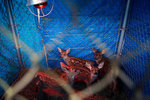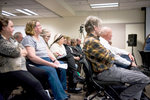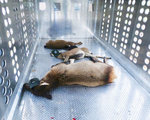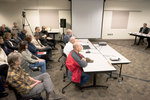



On Monday, the Washington Department of Fish and Wildlife announced its intention to allow 11 deer fawns to remain at For Heaven’s Sake Animal Rescue and Rehabilitation in Rochester for the rest of the winter.
That announcement comes just over a month after the WDFW raided the volunteer-run animal rescue facility and rescinded its permit to care for large animals. That actions was taken following a tip from a former volunteer alleging that young ungulates at the center were becoming habituated to the presence of humans. The WDFW ultimately deemed the ungulates to be unfit for wild release.
On Nov. 9, WDFW agents arrived at For Heaven’s Sake with a trailer and removed three deer fawns and one elk calf with the assistance of tranquilizer darts. Those animals were euthanized shortly after being taken from the facility. However, the WDFW was unable to capture 11 other young deer that the agency had deemed to be too friendly to humans after those deer fled into a nearby wooded area.
Following that action, the WDFW stated its intention to return to For Heaven’s Sake at a later date in order to retrieve the remaining 11 fawns, all of which are male, for additional evaluation.
Public outcry over the WDFW’s decision to kill the first four ungulates appeared to give the WDFW pause, though.
Earlier this month, Adam Karp, attorney for For Heaven’s Sake, told The Chronicle that his clients had reached an unofficial agreement with the WDFW to allow the deer to remain at the facility the rest of the winter, as the facility operators have typically done. The agreement announced on Monday confirms that change of heart within the WDFW.
A press release from the WDFW noted that while their initial action to seize and kill the calf and three fawns was consistent with state regulations, wildlife managers are now willing to work with Claudia and David Supensky, owners of For Heaven’s Sake Wildlife Rescue and Rehabilitation, in order to find a non-lethal alternative for the remaining 11 fawns.
“The department has a responsibility to intercede when animals become too habituated to humans to survive in the wild,” said Eric Gardner, chief of WDFW’s Wildlife Program, in a press release. “We removed four animals that displayed signs of severe habituation, but we’ve agreed to work with the owners to find a mutually acceptable solution for the other deer in their care.”
Prior to the removal of the first four ungulates, the WDFW contacted numerous rescue operations and animal care facilities in an effort to find a home for the animals. The only offer they received was from WSU in a plan that could have placed up to six female deer into a nutritional study program.
The WDFW says that their new agreement with the Supenskys will allow the remaining fawns to stay at For Heaven’s Sake through March 16, 2018. Gardner said the WDFW will continue to evaluate the condition of the deer and search for possible homes come spring time.
The Supenskys have operated For Heaven’s Sake on their home property since 2010. In a press release, Gardner described the couple as “caring people who work hard on behalf of the animals in their care.”
However, Gardner added that the euthanized animals had exhibited traits associated with deer that are habituated to humans through too much exposure. The Supenskys argue that the elk calf was still being nursed and the deer had just recently been weaned, which fits their standard protocol over the years.
The WDFW noted that the new agreement requires the Supenskys to minimize contact with the remaining deer. The agreement also walks back the previous action that invalidated their permit to care for large animals. Instead, a press release from the WDFW noted that, “If they choose to keep taking ungulates, the agreement commits them to work with WDFW to develop a corrective action plan for their facility.”
Gardner noted that many fawns that wind up in the rescue centers are actually taken by well-meaning members of the public without good reason. Does are known to leave their fawns bedded down during the day, so fawns found alone are not necessarily abandoned.
“It’s never a good idea to remove a fawn from its natural environment,” Gardner noted. “If you’re concerned about an animal’s situation, please call a WDFW regional office.”
Additional information on wildlife rehabilitation centers in Washington can be found online at wdfw.wa.gov/conservation/health/rehabilitation.